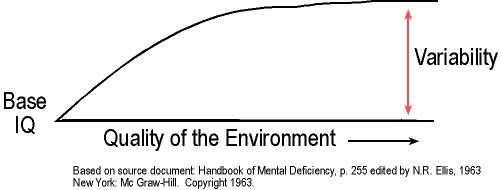| ESE424 : The Class : Students : Mental Retardation: Environmental | |||||
Environmental or Unknown Causes of Mild Mental Retardation
The second major category of causes of mild mental retardation is referred to globally as environmental factors. These environmental factors are variables that are closely linked to poverty. In many instances, a true cause-effect relationship cannot be established. Rather, these environmental factors are highly correlated with mild mental retardation and therefore are assumed to be the greatest contributor to this disability.
As you remember, the majority of mild mental retardation, some would say upwards to 85% of the cases, are related to environmental or unknown causes.

Causes of Mild Mental Retardation
Click on each piece of the pie chart to see a distribution of more specific
factors
For a more detailed analysis, click on the link below and look at the estimate of unknown or other causes.
In this topic you will learn about the potential environmental correlates of mild mental retardation. These are
- stimulating environments
- a focus on meeting daily living needs (survival focus)
- teenage mothers
- health care problems
- diminished educational opportunities
Environmental Correlates
As I stated in the introduction to the previous unit, the view that mild mental retardation is an environmental problem is still quite prevalent. The environmental notion of mild mental retardation is closely linked to the idea that these children are raised in generally understimulating, austere environments. This may be true in some instances - we are still uncovering examples where children have been held in deprived environments during their developmental years - but the majority of children with mild mental retardation do not have a history of neglectful environments. You should also note that while most of the cases of mild mental retardation can be linked to environmental variables that are inherent in poverty, as you learned in the last topic one must still consider that a smaller portion of cases of mild mental retardation are a result of organic causes.
As Bernie-Smith, Itenbach, and Patton (1994) note, caution must be exercised in attributing a cause-effect to variables associated with poverty causing mental retardation. They cite 3 cautions.
- we must be sure to separate the effects of poverty from the cultures that live in the environment of poverty
- while continued research attempts to separate the factors that cause mild mental retardation, they most probably work in a complex, interactive process
- the vast majority of persons living in poverty do not have mild mental retardation.
Armed with these cautions, let us examine some of the environmental correlates of mild mental retardation. To guide us, I created this model. Click on each factor to see how these are related to mild mental retardation.

An interactionist view
In all probability these factors work in conjunction with many other, as yet unknown, variables leading to a complex, interactive process. This view would contend that a person with a predisposition to mental retardation (organic or environmental) and that it is the quality of the environment that leads to the variability of expression in mental retardation. Thus, a person with mild mental retardation would have a higher initial IQ and, to the extent that the environment was supportive and enriched, they may reach near normal levels of intellectual functioning. Given a less stimulating environment, the result of the initial predisposition toward mental retardation would lead to more pronounced intellectual impairment. The figure below illustrates this interactionist view of biological or environmental predisposition and environmental influences.

Once you have completed this lesson, you should:
Go on to
Online Lesson 2: Can We Prevent Mild Mental Retardation?
or
Go back to The Class
Page
E-mail the instructor at Larry.Gallagher@nau.edu
Web site created by the NAU OTLE Faculty Studio
Copyright 1998 Northern Arizona University
ALL RIGHTS RESERVED
